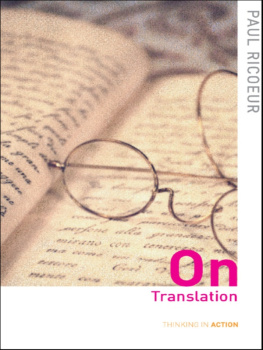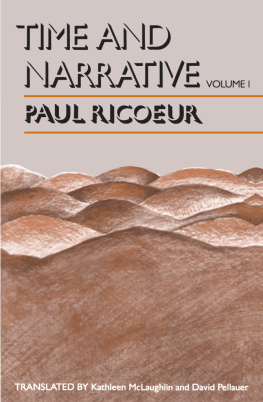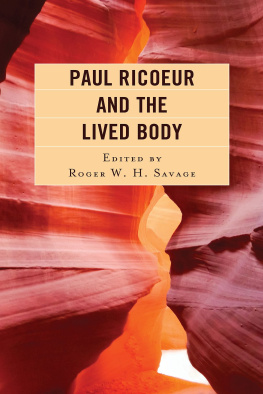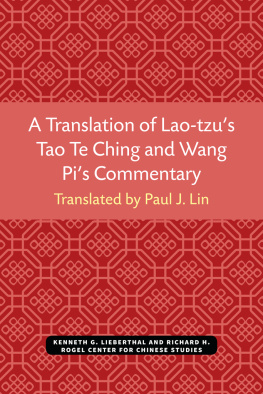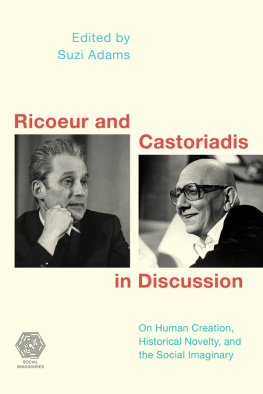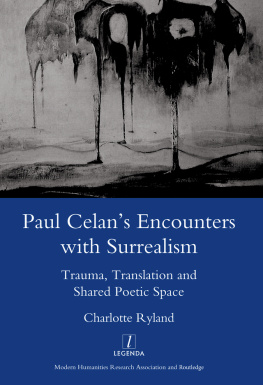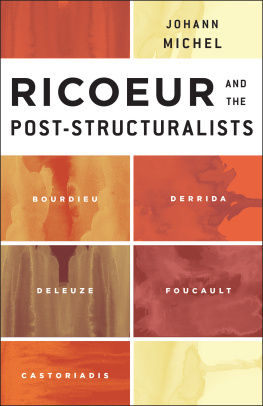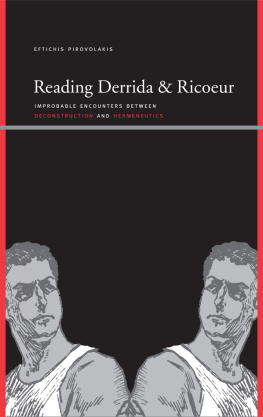Ricoeur Paul - On Translation
Here you can read online Ricoeur Paul - On Translation full text of the book (entire story) in english for free. Download pdf and epub, get meaning, cover and reviews about this ebook. City: London;New York, year: 2006;2011, publisher: Routledge, genre: Home and family. Description of the work, (preface) as well as reviews are available. Best literature library LitArk.com created for fans of good reading and offers a wide selection of genres:
Romance novel
Science fiction
Adventure
Detective
Science
History
Home and family
Prose
Art
Politics
Computer
Non-fiction
Religion
Business
Children
Humor
Choose a favorite category and find really read worthwhile books. Enjoy immersion in the world of imagination, feel the emotions of the characters or learn something new for yourself, make an fascinating discovery.
- Book:On Translation
- Author:
- Publisher:Routledge
- Genre:
- Year:2006;2011
- City:London;New York
- Rating:3 / 5
- Favourites:Add to favourites
- Your mark:
- 60
- 1
- 2
- 3
- 4
- 5
On Translation: summary, description and annotation
We offer to read an annotation, description, summary or preface (depends on what the author of the book "On Translation" wrote himself). If you haven't found the necessary information about the book — write in the comments, we will try to find it.
On Translation — read online for free the complete book (whole text) full work
Below is the text of the book, divided by pages. System saving the place of the last page read, allows you to conveniently read the book "On Translation" online for free, without having to search again every time where you left off. Put a bookmark, and you can go to the page where you finished reading at any time.
Font size:
Interval:
Bookmark:

One of the most distinguished and prolific philosophers of his generation.
The Daily Telegraph
... allows a space for distinguished thinkers to write about their passions.
The Philosophers Magazine
... deserve high praise.
Boyd Tonkin, The Independent (UK)
This is clearly an important series. I look forward to receiving future volumes.
Frank Kermode, author of Shakespeares Language
... both rigorous and accessible.
Humanist News
... the series looks superb.
Quentin Skinner
... an excellent and beautiful series.
Ben Rogers, author of A.J. Ayer: A Life
Routledges Thinking in Action series is the theory junkies answer to the eminently pocketable Penguin 60s series.
Mute Magazine (UK)
Routledges new series, Thinking in Action, brings philosophers to our aid ...
The Evening Standard (UK)
... a welcome series by Routledge.
Bulletin of Science, Technology and Society (Can)
Routledges innovative new Thinking in Action series takes the concept of philosophy a step further.
The Bookwatch
First published in 2004 in French as Sur la traduction by Bayard, 3 et 5 rue Bayard, 75008 Paris, France
English translation as On Translation first published 2006
by Routledge
2 Park Square, Milton Park, Abingdon, Oxon OX14 4RN
Simultaneously published in the USA and Canada
by Routledge
270 Madison Ave, New York, NY 10016
Routledge is an imprint of the Taylor & Francis Group, an informa business
This edition published in the Taylor & Francis e-Library, 2006.
To purchase your own copy of this or any of Taylor & Francis or Routledges collection of thousands of eBooks please go to www.eBookstore.tandf.co.uk.
Sur la traduction 2004 Bayard
On Translation 2006 Routledge
Introduction 2006 Richard Kearney
All rights reserved. No part of this book may be reprinted or reproduced or utilized in any form or by any electronic, mechanical, or other means, now known or hereafter invented, including photocopying and recording, or in any information storage or retrieval system, without permission in writing from the publishers.
British Library Cataloguing in Publication Data
A catalogue record for this book is available from the British Library
Library of Congress Cataloging-in-Publication Data
Ricoeur, Paul.
[sur la traduction. English]
On translation / Paul Ricoeur; translated by Eileen Brennan, with an introduction by Richard Kearney
p. cm. (Thinking in action)
1. Translating and interpreting. I. Title. II. Series.
P306.R53713 2006
418.02-dc22 2005001403
ISBN 0-203-00383-7 Master e-book ISBN
ISBN10: 0-415-35777-2 (hbk)
ISBN10: 0-415-35778-0 (pbk)
ISBN10: 0-203-00383-7 (ebk)
ISBN13: 978-0-415-35777-7 (hbk)
ISBN13: 978-0-415-35778-4 (pbk)
ISBN13: 978-0-203-00383-1 (ebk)
The three essays in this volume were published together in French by Bayard, Paris in 2004 under the title Sur la traduction. Translation as challenge and source of happiness was originally the text of an address given at the German Historical Institute of Paris on 15 April 1997; The paradigm of translation (inaugural lecture at the Faculty of Protestant Theology, Paris, in October 1998) was first published in Esprit 853 (June 1999). A Passage first appeared in Sur la traduction.
Richard Kearney
Translation has been a central feature of Paul Ricoeurs philosophy, though it was not until his later years that he actually made it an explicit theme of his work. The three essays collected in this volume are three such instances.
Well before Ricoeur thematized the subject, the act of translation was something which this leading twentieth-century thinker actually performed in his philosophical practice. Ricoeur was an inveterate mediator, someone who navigated and negotiated transits between rival intellectual positions. He was unequalled as a diplomat of philosophical exchange, forever finding a point of commerce if not always resolution between ostensibly irreconcilable viewpoints. Between Continental and Anglo-Saxon thought at the most general level. Then, within the Continental tradition more specifically, between existentialism and structuralism; between hermeneutics and Critical Theory; between phenomenology and the human sciences; between Freudian psychoanalysis and Hegelian dialectics; between literary theory and the philosophy of religion; between historical understanding (Verstehen) and scientific explanation (Erklren); between psychology and neuroscience; between ethics and politics, and so on. What is remarkable in all these critical intercessions is that Ricoeur never ceased to respect both adversarial partners in the exchange, deftly transmuting conflict into conversation. And this without ever sacrificing depth of conviction or acuity of evaluation. In his philosophical role as translator, Ricoeur was, I believe, unrivalled in his time. In a sense, one could say that Ricoeurs thought represented both philosophy as translation and a philosophy of translation.
Before proceeding to a more detailed account of Ricoeurs thematic analysis of translation, however, I wish to offer a brief overview of Ricoeurs expansive intellectual itinerary from his youthful explorations of existential phenomenology to his final writings on narrative, memory and history.
Paul Ricoeur died in his sleep at the age of ninety-two at his home in Chtenay-Malabry (Hauts-de-Seine outside Paris) on 20 May 2005.
Ricoeur was one of the most challenging, hospitable and enduring thinkers of the twentieth century. Born in Valence, France, in 1913, he taught as professor of philosophy at the universities of Strasbourg, Paris (IV and X) and Louvain and as John Niveen Chair at the University of Chicago. Ricoeur published over thirty major works during his lifetime, ranging from existentialism and phenomenology to psychoanalysis, politics, religion and the theory of language. But Ricoeur was much more than a brilliant intellectual mediator between competing schools of thought. He also, and most significantly, developed his own particular brand of philosophical hermeneutics. Determined to find a path between (1) the romantic hermeneutics of Schleiermacher and Gadamer and (2) the more radical hermeneutics of deconstruction (Derrida, Caputo) and Critical Theory (Habermas), Ricoeur endeavoured to chart a middle way which combined both the empathy and conviction of the former and the suspicion and detachment of the latter. He himself never gave a name to this third path (he was wary of founding a new ideology or -ism). But I think we would not be far wrong in naming it dialogical or diacritical hermeneutics. There were not many major figures in contemporary thought Husserl, Freud, Rawls, Heidegger, Wittgenstein, Foucault, Lvi- Strauss, Saussure, Austen, Arendt, Jaspers, Marcel, Habermas, Levinas, Derrida with whom he did not engage in robust debate.
Taking his tune from such German hermeneutic thinkers as Dilthey, Heidegger and Gadamer, Ricoeur elaborated a complex set of inquiries into what he called the enigma of semantic innovation. How does new meaning come to be? How do we reconfigure the meanings of the past? These basic hermeneutic questions were guided by the thesis that existence is itself a mode of interpretation (
Font size:
Interval:
Bookmark:
Similar books «On Translation»
Look at similar books to On Translation. We have selected literature similar in name and meaning in the hope of providing readers with more options to find new, interesting, not yet read works.
Discussion, reviews of the book On Translation and just readers' own opinions. Leave your comments, write what you think about the work, its meaning or the main characters. Specify what exactly you liked and what you didn't like, and why you think so.

